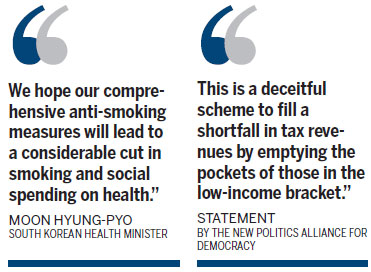South Korea looks at 80% cigarette price hike
South Korea proposed a steep 80 percent hike in cigarette prices on Thursday to cut consumption in a nation with one of the world's highest male smoking rates.
The decision requires parliamentary approval, and its passage is not guaranteed, but Health Minister Moon Hyung-Pyo said it was necessary to counter what has become the "biggest threat to national health".
The proposal would see the average price of a pack of cigarettes rise from 2,500 won ($2.42) to 4,500 won beginning on Jan 1.
Moon said his ministry predicted the increase would help cut tobacco consumption by 34 percent and raise annual tax revenues by 2.8 trillion won.
Around 44 percent of adult South Korean men are smokers, the highest rate among member countries of the Organization for Economic Cooperation and Development, ahead of Turkey, Greece, Estonia and Japan.
The government has taken a series of measures in recent years to bring down the rate, including a ban on smoking in public places.
Beyond the price hike that was announced on Thursday, Moon said tobacco packaging would have to include pictures of the harm caused by smoking, while tobacco ads would be banned in retail stores.

"We hope our comprehensive anti-smoking measures will lead to a considerable cut in smoking and social spending on health," Moon said.
The Korean Smoking Association has opposed the increase, accusing the government of scapegoating smokers to raise tax revenues and offset rising welfare costs.
The government has promised to spend 316 trillion won between now and 2018 on social welfare.
Anti-smoking groups had called for the price increase, but parliamentary approval is not certain.
Some ruling-party politicians have voiced fears that such a steep rise might fuel an electoral backlash, while others opposed the move outright.
"This is a deceitful scheme to fill a shortfall in tax revenues by emptying the pockets of those in the low-income bracket, "the New Politics Alliance for Democracy said in a statement.
Smoking and its impact on public health in South Korea has become a topic of heated public debate and litigation in recent years.
In April, the Supreme Court rejected a damage lawsuit filed by 30 lung cancer patients against KT&G, which controls more than 60 percent of the tobacco market, which is estimated at more than $9 billion.
State health insurers filed a separate lawsuit against three domestic and foreign tobacco makers, seeking damages of 53.7 billion won for alleged smoking-related illnesses.
They claimed to have spent about 1.7 trillion won each year to help treat diseases caused by smoking.
Neighboring Japan has had some success in bringing down its smoking rate, which peaked at 49.4 percent of the population in 1966, when a record 83.7 percent of adult men smoked.
A survey published in July showed that the national rate had dropped below 20 percent for the first time, with 30.3 percent of adult men and 9.8 percent of adult women smoking.
The survey was conducted a month after Tokyo raised sales taxes for the first time in 17 years, pushing up the price of cigarettes, alcohol and other consumer goods.
(China Daily 09/12/2014 page10)








